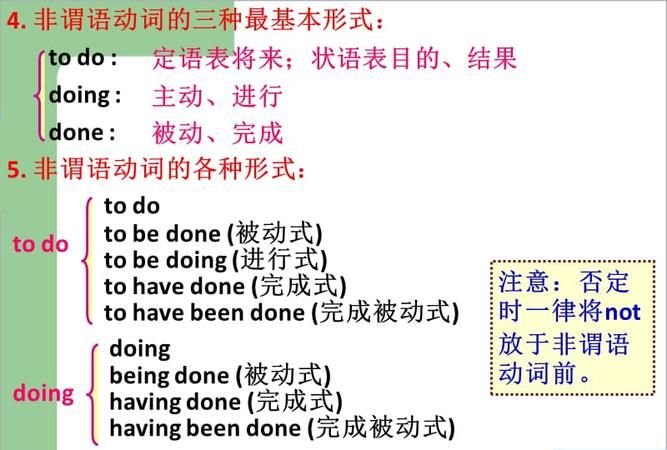本文目录
上海市虹口区钟山初级中学初三的动词不定式ppt
这个还真的没有
可能要问任课老师索取下吧
我这里手头有点,看看能帮上忙不?
动词不定式
一 概说
动词不定式是英语中非限定/非谓语动词的一种形式。非限定动词与限定动词不同。限定动词在句子当中用作谓语,受主语的人称、数的影响和限制。例如:
1) I put my book down and I looked out of the window.
2) Once a police officer was taking a thief to a city from a small town.
3) I’ll go and get some water for you.
4) You must wait right here.
5) Have you ever seen the film?
6) The film was directed by Zhang Yimou.
7) She goes to school every day.
8) They are too far away from us.
非限定动词在句中不可以单独作谓语,不受主语的人称和数的限制,但在句中可以做其他成分。
二、动词不定式的形式和性质
不定式有两种形式:一种是带to的不定式,一种是不带to的不定式(即通常所说的动词原形)。动词不定式的否定形式是在不定式前加上not --- not (to) do 。
三、动词不定式的功用
动词不定式在句中可以作主语、表语、宾语、定语、状语和补语等句子成分。
一)可以作主语
1) To see is to believe.
2) To run in the morning is good for our health.
3) It's our duty to keep our environment clean and tidy.
4) How long does it take you to get there?
It takes us an hour to get there.
5) How much did it cost you to send the package?
It cost me 20 yuan to send the package.
注意:动词不定式作主语时常用it作形式主语,而往往将动词不定式放在谓语或表语之后。如: It's not easy for them to learn a foreign language =To learn a foreign language is not easy. 学好一门外语不容易。在此句型中,如果要说明动词不定式的动作是谁做的,可在不定式前加一个for 引起的短语,作不定式的逻辑主语。如:
1)It's difficult for us to finish the work.
2)It's easy for me to answer your question. 3) It’s very important for students to listen to teachers carefully in class.
但是,如果表语是kind, nice, right, wrong, clever, polite, rude, good, bad 等描述行为者的性格、品质的形容词,则应在不定式前加一个of 引起的短语。如:
这个例子属于上面的换一个of引起的。
1) It's very kind of you to help me.你能帮我,真好。
2) It’s very rude of her to say such words.
注意: 1. of sb.和for sb.这两种结构还有一个区别,在of sb.结构中,可用sb.直接作句子的主语来改写成“It's+形容词+of sb.+动词不定式”结构。试比较:
It's foolish of him to go alone. (=He was foolish to go alone.) 他单独出去太傻了。
It's kind of you to give me the book. (=You are kind to give me the book.) 你给我这本书,真是太好了。
for sb.结构则不能这样转换。例如,不可以说:We are difficult to
finish the work.
疑问代(副)词+动词不定式”也可以在句中作主语。如:
1) How to control the water
pollution is a big problem. 如何控制水污染是一个大问题。
2) When to start the project
remains undecided. 什么时候开始这项工程仍然没有决定。
3) How to do it/what to do is a big problem for us.
二). 作宾语
动词不定式作宾语.即不定式直接跟在谓语动词后,是谓语动词涉及的直接对象. 能直接带不定式作宾语的及物动词主要有: want, like, love, need , try, ask, learn, begin, start, forget, remember, hope, wish, agree, choose, fail, refuse, decide, afford, offer, continue
make sure, take turns, prefer
would like, plan, hate, pretend, happen, expect 等.
1) Danny wants to write a limerick for Li Ming.
2) I liked to play basketball.
3) He refused to answer my questions.
4) I decided to write about nature.
注意:上列所给出动词有些既可以跟to do作宾语,也可以跟doing作宾语,而且意义基本一致。如:like to do/doing, love to do/doing, hate to do/doing, start to do/doing, begin to do/doing, prefer to do/doing, continue to do/doing
I like/prefer swimming in summer but this summer I like/prefer to stay at home.
但是在英语中,还有一些动词也是既可以跟to do,也可以跟doing,但是意义变化非常大。例如:stop to do/doing,forget to do/doing, remember to do/doing,
go on to do/doing ,try to do/doing
**另外,有时不定式宾语后面还带有补足语等其他成分时,常用it作形式宾语,把不定式宾语放在宾语补足语之后。例如,在find/feel+it+adj.+to do sth.句型中,it是形式宾语,真正的宾语是后面的动词不定式。
1) I found it easy to learn
English.
I found (that) it was easy to
learn English.
Did you find _____ easy to learn English?
it , it is, it was
2) I feel it natural to speak to a foreigner in English.
I feel (that) it is natural to speak to foreigner in English
三). 作宾语补足语 宾语补足语放在宾语的后面,补充说明宾语在干什么能用动词不定式作宾语补足语的动词有: ask sb (not) to do, tell, get, order , advise, would like, want, teach, allow, encourage, warn, wish.
1) I tell him not to go there by bus .
2) Edison's mother taught him to read and write.
3) The old man asked us to visit his house last Sunday.
3) Our teachers always encourage us to work hard.
还有一类动词也可以跟动词不定式作宾语补足语,但是省略了动词不定式符号 to. 例如:let sb (not) do, make, help,have,see,hear,feel,watch, notice
1) The boss makes them work 16 hours a day.
2) I heard her sing in the next room yesterday.
提示:若变成被动语态,在上述结构中,不定式符号to要加上。
如: 1) They are made to work 16 hours a day by the boss.
2) She was heard to sing in the next room.
四) 作定语 放在被修饰的名词、代词后面
1) I have a lot of work to do.
2) The doctor said he could do
nothing to help the boy.
3) Poetry is a beautiful way to express feelings and thoughts.
4) We need a park to play
soccer.
5) There is nothing to be
worried about.
6) He was the first person to think of the idea.
7) She was the first woman in the Olympics to win both medals.
提示:如果动词不定式和前面所修饰的词构成动宾关系,若动词是不及物动词,切记不要忘掉介词。如:
1)I have a small bedroom to
live in.
2) Have you got some pens to
write with?
3) I need a friend to talk to.
4) She is a nice person to
work with/get on well with.
五). 动词不定式作状语: 即不定式直接跟在谓语动词后,仅对谓语动词起一个补充说明的作用.如果没有它,句子仍然意思完整,它不像作宾语那样,与谓语动词有着密切的关系.
1)表示目的
1)The doctor came to operate on her.
2) He has gone to town to
do some shopping.
6) To learn English, Ms. Liu went to London.
4) He stopped to have a look.
5) He rushed into the room to save the girl.
7) They moved away the stone
to let the traffic go.
*2表示结果:
1) The girl cried only to make her mother angry.
3) They arrived late only to
find the train had left.
3表示程度:
1) She is too tired to walk any farther.
2) She is strong enough to carry the heavy box.
4表示原因: I was surprised to read the news.
提示:能带不定式作状语的形容词有: glad , happy , pleased , angry , clever , careful , surprised , lucky ,ready ,sorry, amazed , afraid ,sad , unhappy , sure , free ,kind, nice , worried , easy , hard
1)Glad to meet you.
2) He is sure to come.
5) We are getting ready to have a long trip next Friday.
4) We are afraid to leave alone at night.
6) The girl is not easy to get
along with.
7) Be careful not to catch a
cold.
六 作表语:
My job is to teach English.
His wish is to become a scientist.
They are to fly to Wuhan this Sunday.
七. 动词不定式和疑问词连用.动词不定式可以和疑问词what, which , how , when , where ,who等连用,构成不定式短语,在句子中作主语、宾语、表语等成分.这时往往可以扩写成一个从句
1) How to use the computer is a question.= How we use the computer is a question.
2) I don’t know where to go for my holiday =I don’t know where I can go for my holiday.
3) He can’t decide which book to choose.= He can’t decide which book he can choose.
4) I don’t know what I should do next=I don’t know what to do next.
8) Tell me how to do it= Tell me how I should do it.
八. 用在某些特定的结构中
1) She was too young to understand that
2) We had enough food to last a week.
3) Let’s walk faster so as to catch the bus
4) We went by car in order to save time
练习:Tell the function of the infinitive in the following sentences(说出不定
式下列各句中的作用)
1 .To learn grammar is not an easy thing.
2.Uncle Tom decided to give Mary a bicycle
3 .He wants everybody to be happy.
4 .I like to walk along the sea-shore.
I like you to work hard.
5 .Let’s join them in the game•
6.Nancy felt her heart beat with excitement.
7 .I hope to see them again.
8 .Your job is to dry the dishes.
9. Mother went to town to do some shopping
10 .I’11 teach you how to do the job.
12 . She was glad to see us back.
13 .The best thing is to say nothing.
14 .We have come to help you.
15 .Give me something to read.
16 .It gave me great pleasure to see their happy faces.
II .underline the object of the verbs in the following sentences(找出下列各句中的宾语)
1 .They considered it better not to go.
2 .She felt it her duty to take care of the children
3 .I thought it unnecessary to argue with him.
4 .He made it a rule only to speak English in class
5 .He thinks it important to help his friends.
6 .I find it hard to get on with her.

什么是非谓语动词不定式分词动名词三者区别 希望有例句一目了然简洁
在句子中充当除谓语以外的句子成分的动词形式叫做非谓语动词
是动词的非谓语形式.动词一般在句子中充当谓语.在句中可起名词,形容词,副词的作用,在句中充当主语,宾语,表语,补语,定语或状语.即动词的非谓语形式除了不能独立作谓语外,可以承担句子的任何成分
3种形式:不定式,分词(现在分词、过去分词),动名词
1.非谓语动词与谓语动词的相同点有:
(1)如果是及物动词都可与宾语连用,例如:
They built a garden.
They suggested building a garden.
(2)都可以被状语修饰:
The suit fits him very well.
The suit used to fit him very well.
(3)都有主动与被动,“体”式(一般式;进行式;完成式)的变化.例如:
He was punished by his parents.(谓语动词被动语态)
He avoided being punished by his parents.(动名词的被动式)
We have written the composition.(谓语动词的完成时)
Having written the composition,we handed it in.(现在分词的完成式)
(4)都可以有逻辑主语
They started the work at once.(谓语动词的逻辑主语)
The boss ordered them to start the work.(动词不定式的逻辑主语)
We are League members.(谓语动词的主语)
We being League member,the work was well done.
(现在分词的逻辑主语)
2、非谓语动词与谓语动词的不同点有:
(1)非谓语动词可以有名词作用(如动词不定式和动名词),在句中做主语、宾语、表语.
(2)非谓语动词可以有形容词作用(如动词不定式和分词),在句中做定语、表语或宾语补足语.
(3)非谓语动词可以有副词作用(如动词不定式和分词),在句中作状语.
(4)谓语动词在句中作谓语,受主语的人称和数的限制;非谓语动词在句中不能单独作谓语,它不受主语的人称和数的限制.
英语中的分词分两种:现在分词(the present participle)和过去分词(the past participle).不定式:to do动名词:doing

英语非谓语的形式
第一部分: 非谓语动词用法详解
一、不定式的用法
1. 不定式的构成
不定式是由不定式符号to+动词原形构成,在某些情况下to也可省略。
不定式一般有时式和语态的变化,通常有下表中的几种形式(以do为例):
主动式 被动式
一般式 to do to be done
完成式 to have done to have been done
进行式 to be doing /
完成进行式 to have been doing /
1) 不定式的一般式
不定式的一般式所表示的动作通常与主要谓语的动作同时或几乎同时发生,或是在它之后发生。如:
They invited us to go there this summer. 他们邀请我们今年夏天去那儿。
He stood aside for me to pass. 他站到一边让我通过。
2) 不定式的完成式
不定式的完成式所表示的动作在谓语所表示的动作之前发生,它在句中可作表语、状语、宾语,有时也可作主语、定语等。如:
She seemed to have heard about this matter. 她似乎已听说过这件事。
I am sorry to have kept you waiting so long. 我很抱歉让你等了这么久。
I meant to have told you about it, but I happened to have an important thing to do.
我本来想告诉你这件事的,但我碰巧有一件重要的事要做。
It has been an honor for me to have traveled so much in your country.
对我来说,在你们国家旅行这么多地方是一件很荣幸的事情。
3) 不定式的进行式
不定式的进行式表示正在进行的与谓语动词同时发生的动作。它在句中可以用作除谓语以外的所有成分。如:
It’s nice of you to be helping us these days. 你真好,这些天一直帮我们。
He pretended to be listening to the teacher carefully. 他假装在认真地听老师讲课。
We didn’t expect you to be waiting for us here. 我们没料到你一直在这儿等我们。
4) 不定式的完成进行式
如果不定式表示的动作是谓语所表示时间之前一直进行的动作,就需要用完成进行式。如:
They are said to have been working in Tibet for 20 years. 据说他们已经在西藏工作20年了。
We are happy to have been helping each other these days. 我们很高兴这些天能互相帮助。
5) 动词不定式的否定形式是由not或never加不定式构成。如:
Try not to be late again next time. 尽量下次不要再迟到。
He wished us never to meet her again. 他希望我们永远不要再见到她。
6) 疑问词+动词不定式:
不定式和疑问词whether, what, which, whom, where, when, how, why等连用可以在句中起名词的作用。
注意: why与不带to的不定式连用,其它的词应与带to的不定式连用。
How to get rid of waste is a great problem for the world today. (SBⅢ P32)
I’m not sure whether to go to the one about accidents. (SBⅢ P1)
On hearing the news, he didn’t know whether to laugh or to cry.
听到这个消息,他不知道该哭还是该笑。
When to hold the meeting has not decided. 什么时候开会还没有决定。
The most important problem is how to get so much money.
最重要的事情是如何搞到这么多钱。
Why do that? = Why did you do that? 你为什么要那么做?
Why not do it yourself? = Why don’t you do it yourself? 你为什么不自己做呢?
介词后一般不直接接不定式,但可以接疑问词+不定式短语作宾语。如:
Mary gave some advice on how to learn English. 玛丽提了一些如何学习英语的建议。
I have no idea of how to do it. 我不知道该怎么做。
7) 不定式的被动式:
当不定式逻辑上的主语是这个不定式所表示的动作的承受者时,不定式一般要用被动形式,to be +过去分词和to have been +过去分词。这些形式可以用来作主语、表语、宾语、定语、状语、补语。如:
It’s a good thing for him to have been scolded by the teacher.
对他来说,被老师责备是一件好事。
He asked to be sent to work in the countryside. 他要求被派往农村工作。
She was the last person to have been mentioned at the meeting.
她是会上最后一个被提到的人。
I had to shout to be heard. 我不得不大喊才能被听到。
We don’t like our friends to be laughed at from time to time.
我们不喜欢我们的朋友不时地被嘲笑。
2. 不定式的语法作用
1) 不定式作主语:
To see once is better than to hear a hundred times. 百闻不如一见。
To master a foreign language is not an easy thing. 掌握一门外语不是一件容易的事。
在很多情况下,人们通常用it作为形式上的主语,而把不定式短语移到谓语之后,使句子显得平稳一些。如:
It’s good manners to wait in line. 排队等候是很有礼貌的。
It made us very angry to hear him speak to his mother like that.
听到他那样跟他妈妈说话我们很生气。
2) 不定式作表语:
The most important thing is to put theory into practice.
最重要的事情是把理论付诸实践。
The greatest happiness is to work for the happiness of all.
最大的幸福就是为大家的幸福而工作。
3) 不定式作宾语:
He wanted to know the truth. 他想知道真相。
I prefer to be starved to death rather than beg. 我宁愿被饿死也不愿乞讨。
He pretended to have read the book when I asked him about it.
我问到他的时候,他假装读过这本书。
另外,不定式在某些复合宾语中作宾语时,人们常常用it代表不定式,而将真实宾语放在补足语之后。如:
Do you think it better to translate it in this way? 你认为这样翻译是不是更好?
I feel it a great honor to be invited to speak at the meeting before so many students.
我觉得被邀请在会上面对这么多学生发言是一件很光荣的事情。
4) 不定式作补语:
①不定式可以和名词或代词一起构成复合结构作动词的宾语,这时不定式被称为宾语补足语。如:
I would like you to help me with my English exercises. 我想请你帮我做英语练习。
I never expected the shoes to be worn out so soon. 我从来没想到鞋子这么快就穿破了。
注意:动词help后面接不定式作宾语或宾语补足语可以带to也可以不带to。如:
Who can help me (to) carry this heavy box? 谁能帮我拎这个重箱子?
②在make, let, have等使役动词和see, watch, notice, hear, feel等感官动词后的复合宾语中,动词不定式不带to。
I often hear her sing in the next room. 我经常听到她在隔壁唱歌。
They make the baby go to bed at 7:00 p.m. every day.
他们每天让孩子晚上7:00上床睡觉。
注意:get, leave等词也有“让”“叫”的意思,和使役动词意思相近,但它们后面的不定式作宾语补足语必须要有to。如:
I’ll get him to try it again. 我将让他再试一次。
How could you leave him to have supper with a stranger?
你怎么让他跟一个陌生人一起吃晚饭?
注意:当使役动词和感官动词变为被动语态时,不定式就成了主语补语,作主语补语的不定式必须加to。如:
Though he had often made his little sister cry, today he was made to cry by his little sister.
尽管他经常弄哭他的小妹妹,但今天他却被他的小妹妹弄哭了。
He is often heard to sing the song. 经常有人听到他唱这首歌。
③think, consider, believe, declare, suppose, find, imagine, know, understand, take, prove, feel等动词后面接的不定式短语作补语多由to be+形容词或名词构成,think, consider, find后的to be常可省略。如:
When he woke up, she found herself (to be ) badly injured.
她醒来的时候,发现自己受了重伤。
I thought her (to be) nice and honest the first time I met her.
我第一次见到她的时候就认为她人很好,很诚实。
含有此类复合宾语的句子变成被动语态时,不定式同样被称之为主语补足语。如:
The young man was considered to have great promise. 这个年轻人被认为大有前途。
The situation was found to be quite encouraging. 形势看来很使人鼓舞。
④以be said, be reported, be known, seem, happen, prove, appear等构成谓语的句子中,动词不定式通常也可看作主语补语。如:
More than 20 people were reported to have been killed in the accident.
据报道,有20多个人死于事故。
I happened to be talking with him when he was hit by a car.
他被汽车撞的时候,我碰巧在和他谈话。
5) 不定式作定语:
不定式在句中作定语通常放在其所修饰的名词或代词之后,以下几种情况常用不定式作定语:
①能带不定式作宾语的动词,其同源名词可以带不定式作定语,常见的有attempt, decision, promise, plan, intention, failure, wish, determination等。如:
He hasn’t kept his promise to write to his parents regularly.
他没有遵守诺言定期给他父母亲写信。
My wish to be a teacher is quite understandable.
我想成为一个教师的愿望是可以理解的。
②常与不定式搭配的形容词,其同源名词一般可以带不定式作定语,常见的有ability, anxiety, eagerness, ambition等。如:
His eagerness to finish his work in time was quite obvious.
他急切地想准时完成工作是很明显的。
We admire his ability to speak a foreign language so well.
我们欣赏他能把一门外语说得这么好。
③序数词、形容词最高级或被only, last, next等词修饰的名词可以用不定式作定语。如:
He is always the first person to come and the last one to leave.
他总是第一个来最后一个离开。
The next person to attend the meeting is Dr. Baker.
下一个出席会议的人是贝克先生。
④还有一些名词经常带不定式作定语。如:person, man, thing, something, anything, nothing, time, way, reason, chance, courage, opportunity等。如:
We students should have the courage to face any difficulty.
我们学生应该有勇气面对任何困难。
He had no reason to leave his friends and live alone on the island.
他没有理由离开他的朋友独自住到岛上去。
⑤如果不定式和所修饰的名词是动宾关系的话,不定式动词是不及 物动词,则须加适当的介词。如:
I need a pen to write with. 我需要一支笔。
There are enough chairs for the guests to sit on. 有足够的椅子给客人坐。
They have a large house to live in. 他们住在一座大房子里。
I want to buy a pen to write with. 我想买一支笔写字用。
Please give me a knife to cat with. 请给我一把切东西的刀。
There is nothing for you to worry about. 没有什么可让你担心的。
There are many interesting books to choose from, but I don’t know which to borrow. 有很多有趣的书可以挑选,但我不知道该借哪一本。
6) 不定式作状语:
不定式作状语可以表示行为的目的、结果、原因、条件等。
① 不定式作目的状语,有时也可以用in order (not) to, so as (not) to结构。如:
In order to protect the young plants from the sun, Mother put them in the shade.
为了保护幼苗不被太阳晒坏,妈妈把它们放到了阴凉处。
He got up very early this morning so as not to be late for school again.
今天早上他起身很早以免上学再迟到。
注意:so as (not) to do不可以置于句首。
②不定式作结果状语,常见的结构有too…to, enough…to, so…as to, such…as to, only to…等。如:
The question is too difficult for me to answer. 对我来说,这个问题很难回答。
He said he was clever enough to deal with it by himself.
他说他足够聪明可以独自应付这件事。
Will you be so kind as to turn down the radio? 请你帮我把收音机调低一点好吗?
He woke up only to find himself in hospital. 他醒来发现自己在医院里。
注意:too…to通常表示太……而不……,但在下列句子中没有否定的意思。
She is only too glad to stay at home. 她太想留在家里了。
He is too anxious to know the examination results. 他很急切地想知道考试结果。
③不定式作原因状语,通常用来修饰表示情感、心理状态、性格等的形容词。常见的形容词有:happy, glad, lucky, fortunate, surprised, angry, anxious, ready, quick, slow, cruel, clever, frightened, shocked, sorry, eager, proud, disappointed, foolish, impatient, unwise, naughty等。如:
They are surprised to learn of his death. 得知他死亡的消息,他们很惊讶。
We are proud to be young people of new China. 成为新中国的青年,我们感到很骄傲。
另外,hard, difficult, easy, fit,comfortable等词也可以接动词不定式。这时候,作句子主语的除了是表示人的词外,还可以是表示物的词。如:
The water is not fit to drink. 这水不适合饮用。
The room is very comfortable to live in. 这个房间住起来很舒服。
注意:后两句中的不定式与句子的主语或宾语之间是动宾关系,此时如果不定式动词是不及物动词,则需要带上适当的介词。

谓语是什么意思举个例子
非谓语动词:在句子中充当除谓语以外的句子成分的动词形式叫做非谓语动词。非谓语动词也是动词,但不能作谓语,只能作主语、表语、宾语、补语、状语、定语。非谓语动词分为三种形式:不定式,动名词,和分词(分词包括现在分词和过去分词)。
1)不定式
时态\语态 主动 被动
一般式 to do to be done
完成式 to have done to have been done
2)动名词
时态\语态 主动 被动
一般式 doing being done
完成式 having done having been done
3)分词
时态\语态 主动 被动
一般式 doing being done
完成式 having done having been done
否定形式: not +不定式, not + 动名词, not + 现在分词

以上就是关于非谓语动词ppt课件简洁,初中英语语法非谓语动词的全部内容,以及非谓语动词ppt课件简洁 的相关内容,希望能够帮到您。
